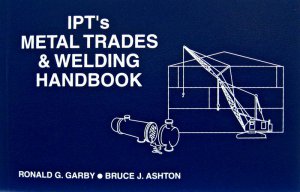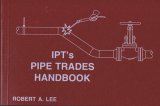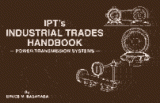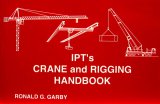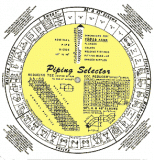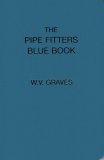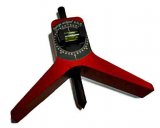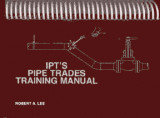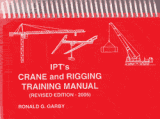IPT's Metal Trades and Welding Handbook
IPT’s Metal Trades & Welding – Setting the Standard
IPT’s inaugural publication back in 1985, The Metal Trades handbook quickly set the standard for industrial books published in North America. Used by veterans and apprentices in all types of industrial and resource-based industries, this handbook and manual dictate the curriculum in many apprenticeship and upgrading programs. Technical schools and colleges alike use the IPT Metal Trades & Welding handbook and manual as the main course of study.
Improved Handbook and Manual Covers Even More
Revised in 2007 to meet industry requests for additional welding information, IPT’s Metal Trades & Welding Handbook and Training Manual now feature 15 detailed sections over almost 600 pages. Topics range from mobile cranes and heat exchangers to concrete reinforcing and welding metallurgy, and everything in between. When it comes to metal trades and welding, IPT covers it all!
Publication Date:1985
Book Size:5.75" x 3.75" x 1"
Pages: 583
Edition:2nd
Cover: Soft Bound
Author: Garby/Ashton
-
Shipping info
We ship to most countries of the world with the exclusion of Portugal, Niger, and Nigeria.
-
Payment methods

-
Return Policy
Take a look at our return policy for full details.
Table of Contents:
Section 1—Mobile Cranes
Crane Identification
Crane Types
Crane Assembly
Crane Dismantling
Crane Gantry
Boom Jib
Load Block Reeving
Ground Conditions
Crane Levelling
Bearing Mats
Lift Planning
Capacity Charts
Operation Quadrants
Load Calculations
Electrical Clearances
Power Line Contact
Tandem Lifts
Carrying a Load
Hoist Signals
Load Weight Estimates
Log Books
Crane Safety Inspection
Section 2—Wire Rope and Hardware
Wire Rope Construction
Wire Rope Lays
Wire Rope Sizing
Wire Rope Grades
Strand Classification
Wire Rope Uses
Wire Rope Forming
Wire Rope Seizing
Wire Rope Replacement
Breaking Strengths
Safe Working Loads
Unloading, Unreeling
Winding on a Drum
Fleet Angles
Drum Capacities
Slings & Chokers
Centering a Load
Softeners
Wire Rope Clips
Shackles
Hooks
Links
Eye Bolts
Turnbuckles
Spreaders, Equalizers
Sheaves
Blocks
Mechanical Advantage
Reeving & Lacing
Chain
Section 3—Fibre Rope
Types of Fibre Rope
Coiling, Uncoiling
Whipping
Rope Inspection
Safety Factors
Safe Working Loads
Crown Knot
Short Splice
Long Splice
Side Splice
Bowline
Bowline on the Bight
Spanish Bowline
Self Centering Bowline
Running Bowline
Clove Hitch
Becket Hitch
Stop Hitch
Barrel Hitch
Reef Knot
Sheet Bend
Carrick Bend
Sheepshank
Cats Paw
Strength Reductions
Block Friction
Block Reeving
Section 4—Charts & Data
Metric Conversion
Decimal Equivalents
Circumference Table
Chord Chart
Feet in Decimals to Inches
Inches to Decimals of Feet
Powers and Roots
Bevels to Slope Degrees
Taps and Drills
Section 5—Layout
Triangle Ratios
Angles & Circle Components
Dividing Angles
Layout 90° Angles
Layout Large Hole in Vessel
Layout Offset Fitting in Shell
Layout Shell for Offset Nozzle
Layout Vessel Centerlines
Layout Centerlines on Flat Shell
Layout Nozzle Location
Flange Layout
Head Layout
Head Baffle Layout
Semi-elliptical Head Layout
Base Ring Layout
Parallel Line Introduction
Two Piece Elbow Layout
Branch of a Tee Layout
True Wye Layout
Four Piece Elbow
Lateral Layoutconcentric
Lateral Layouteccentric
Pipe Centerlines
Pipe Cut Angles
Orange Peel Cap Layout
Right Cone Layout
Triangulation Introduction
Square to Square Layout
Square to Round Layout
Rolling Plate
Section 6—Tanks
Foundations
Laying Floor Plates
First Ring Layout
Shell Plates
First Ring Erection
Shell to Floor
Levelling Tank
Erecting Succeeding Rings
Fitting Horizontal Seams
Vertical SeamsBarrel Roll
Rim Angle
Roof Framework
Laying Roof
Misalignment Tolerances
Scaffolding and Safety
Third Hand Line
Bracket Clips
Planks
Containers
Jumping Scaffold
Section 7—Towers
Inspection
Process Flow
Job Preparation
Tray Removal
Preassembly
Installation
Bulkheads
Seal Welding
Safety Points
Section 8—Heat Exchangers
Introduction
Tubesheet Layout
Shell Side Baffles
Head Baffles
Fixed Tubesheets
Floating Heads
Exchanger Designations
Front Head Designs
Shell Designs
Rear Head Designs
Exchanger Nomenclature
Exchanger Examples
Expansion Joints
Tube Installation
Stud Tightening Sequence
Inspection for Leaks
Head Removal
Tube Removal
Bundle Removal
Exchanger Cleaning
Gasket Installation
Hydrostatic Testing
Section 9—Tube Expanding
Expanded Joint Theory
Boiler Tube Joint Preparation
Boiler Tube Preparation
Boiler Tube Expanding Equipment
Boiler Tube Expanding
Boiler Tube Flaring:
Boiler Tube Maximum Expansion
Compound Tube Gauge
Snap Gauge
Tube Rolling Lubricants
Heat Exchanger Tube Preparation
Heat Exchanger Tube Expanding
Heat Exchanger Tack Tubes
Heat Exchanger Maximum Expansion
Section 10—Piping
Pipe Sizes and Schedules
Flanges
Gaskets
Elbows
Fittings Data
Cutting Elbows
Pipe Prints
Tees
Reducers
Isometrics
Valves
Pipe Fitting Alignments
Section 11—Structural Steel
Structural Shapes Identification
Structural Shapes Designation
Fabricated Structural Members
Structural Symbols
Structural Nomenclature
Gauge Lines
Pitch Lines
Beam Board
Beam Web Gauge
Dimensioning
Right & Left Layout
Coping
Beam Layout
Clip Layout
Miter Joint Layout
Stairways
Ladders
Handrails
Structural Connections
Section 12—Concrete Reinforcing
Types of Reinforcing Bars
Bar Weights
Bar Color Codes
Metric Comparison
General Guidelines
Cut Length Tolerances
Rebar Fabrication
Splicing
Minimum Protection
Accessories
Wire Ties
Standard Column Ties
Section 13—Welding
Welding Safety
Welding Lenses
Arc Flash
Ventilation
Fire Prevention
Oxygen
Acetylene
Manifold Systems
OxyAcetylene Cutting & Welding
OxyAcetylene Equipment
OxyAcetylene Equipment Set Up
Torch Lighting
OxyAcetylene Cutting
Cutting Torches
Preheat Tips
Piercing Holes
Torch Inclination
Alternate Fuel Gas
Low Temperature Brazing
Metal Identification
Carbon Content of Steel
Metal Melting Temperatures
Steel Codes
Sub Classes of Steel
Steel Plate Designation
Metal Comparison Chart
Preheat for Welding
Mechanical Properties of Steel
Distortion from Welding
Basic Weld Joints
Basic Welds
Groove Weld Positions
Fillet Weld Positions
Weld Nomenclature
Groove & Fillet Weld Terms
Weld Symbols
NonDestructive Testing Symbols
Welding Electricity
Resistance Welding
Types of Current
Types of Welding Machines
Welding Cables
Polarity Check
Welding Electrodes
Welding Electrode Classification
Welding Electrode Selection
Stainless Steel Electrodes
Welding Techniques
Welding Methods
Shielded Metal Arc Welding (SMAW)
Gas Tungsten Arc Welding (GTAW)
Gas Metal Arc Welding (GMAW)
Flux Core Arc Welding (FCAW)
Plasma Arc Welding (PAW)
Submerged Arc Welding
Electroslag Welding
Stud Welding
Plasma Arc Cutting
Carbon Arc Cutting
Window Welds
Mirror Welds
Purging
Test Coupon Preparation
Root Pass Variables
Codes & Welder Certification
Section 14—Safety
Accident Prevention
Accident Prevention Committee
Safety Equipment & Apparel
Accident Reporting
Ladders & Scaffolds
Trenching
Vessel Entry
Explosive Actuated Tools
Lifting
Heat Sickness
Control of Bleeding
Shock
Burns
Fractures
Artificial Respiration
Transportation
Blasting Signals
Dust & Fibre Hazards
Sound Hazards
Hydrogen Sulphide
Breathing Apparatus
Fire Extinguisher Chart
Section 15—NonDestructive Testing
NDT Benefits
Material Defects Detection
Types of NDT Testing
Visual Testing
Pressure & Leak Testing
Liquid Penetrant
Magnetic Particle
Transverse/Longitudinal
Prod Method
Yoke Method
MP Powder
Defect Visibility
Ultrasonic Testing
Pulse Echo
Transmission
Resonance
Frequency Modulation
Eddy Current Testing
Eddy Current Penetration
Test Coils
Concentric Coil
Point Probe
Inside/Bobbin Coil
Eddy Current Probes
Radiography
Radiography Sources
X-rays
Gamma Rays
Radiographic Film
Weld Radiography
Tips to Welders
Casting Radiography
Pipe Radiography
Radiography Safety
Section 16—Weld Metallurgy
Heat Affected Zone
Carbon & Low Alloys
Weld Preheat
Interpass Temperature
Weld Postheat
Stress Relieving
Arc Strike
Stainless Steel Welding
400 Series Stainless
300 Series Stainless
AISI Stainless Steels
Stainless Welding Hints
-
ManufacturerIPT Publishing & Training LTD.
-
Publication Date1985
-
Book Size5.75 x 3.75 x 1
-
Pages583
-
Edition2nd
-
CoverSoft Perfect Bound
-
AuthorsRonald Garby and Bruce Ashton
-
ISBN 100920855032
-
ISBN 139780920855034
Shipping Methods
Most of our orders are shipped in the way that is most time efficient and cost effective. In example, if you have a small order that is going to California it will be shipped by USPS Priority, as it is the most time efficient and cost effective. However, since we are in North Carolina, a small order may be sent by UPS Ground to some parts of Virginia, North Carolina, and South Carolina since it will arrive next day. If you are needing a package shipped by a specific carrier please let us know in the "Customer Notes" during the Checkout process. We are not held responsible for packages that are not delivered to you for lack of information. All international packages will be shipped by USPS Priority Express International unless otherwise chosen during the Checkout process.
Our shipping hours are from 9:00 a.m. to 2:30 p.m. Eastern Standard Time. All USPS Priority orders need to be in before 12 p.m. EST to guarantee same day shipping. Any orders placed after 2:30 p.m. EST will be processed and shipped on the next business day. In example, orders that are placed Wednesday evening with UPS 2nd Day Shipping will be shipped out Thursday afternoon and will arrive the following Monday.
Although we will be offering UPS Next Day or UPS 2nd Day, if your package does not get there on time, you will not be refunded for the shipping costs. We cannot control how UPS or USPS operates.
Also, we are limiting our international shipping to countries that have opened their borders to trade with the US. If you do not see your country listed during Checkout, please email us. After placing your order, you will receive an email confirming you understand that there will be delays with shipping out of the US. If you do not respond after a second email notification, your order will be cancelled.
International orders will be shipped once we have verified that we have all items ordered in stock. If an item is on backorder from the manufacturer we will notify you immediately. We will not do partial shipments to anywhere outside of the US. Customs Fees and Import Taxes are not part of Shipping Costs. These duties/fees are the buyer's responsibility. We will email you immediately upon receipt of an international order to confirm your understanding of this. If a package is refused due to Customs Fees or Import Taxes and returned to us, you will be refunded for the price of the products only. We request that you contact your local custom's office to find out more information about these fees and taxes before ordering from us.
Due to the nature of some of our items (i.e. size vs weight ratio) there will be added freight to certain items. Please look over your items carefully and if you have any questions contact us.
We accept the following payment methods:

If you are a business that is already established with us for Net 30 Terms, then you are more than welcome to place an order by Purchase Order and we will be glad to fulfill it for you.
Our Return Policy
If you need to return an item, e-mail us at info@pipefitter.com or call us at 910-592-1310 within 30 days of receipt for instructions. You will receive further instructions with a Return Authorization number. The Return Authorization number MUST be on the package. Any returns requested after 30 Days will be issued a 20% Restocking Fee.
Freight charges for returns/exchanges will be the responsibility of the customer. Pipefitter.com claims no responsibility for missing shipments.
All returns must be in resalable condition, and containing all the original contents.
Merchandise that has been used or show any signs of abuse cannot be returned for refund or exchange. You may be under warranty and must work with the manufacturer to resolve the issue. We will pay freight charges for the return of defective items or if we made a mistake on your original order. Any packages that are returned to us for "Incomplete Address", "Insufficient Address", or "Address - Not Known", will be held at our facility. The customer will be responsible for the second Shipping Cost to the full amount or if requested refunded for the products only.
Returned Merchandise Credits
Credit will be evaluated for each returned item individually. We will refund item costs only. Once an item is received you will be contacted so that we may process your return.
Reasons for Return
Exchange or Credit
All returns will be inspected upon receipt. Upon approval of receipt you will either be credited the monetary value or the monetary value will be put towards an exchange. You will either be credited or charged the remainder of the new order.
If you received your item as a gift, you will need to provide your own form of payment if necessary.
Functional or Visual Defects
We inspect all merchandise before we ship it. In the event that your merchandise is defective, it can be handled in one of the following ways:
“Out of the box” visual defects must be reported within 30 days of receipt.
Functional defects must be reported to the manufacturer. Here’s a list of the manufacturer’s information.
Refunds
Upon an approved receipt you will be contacted for the original payment method of your order. Eligible refunds will be credited to that method of payment. If that payment method declines you will be notified of the situation and another payment method will need to be provided.


